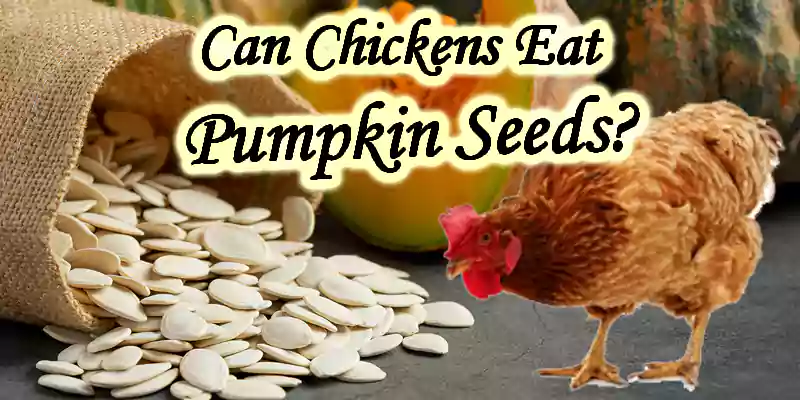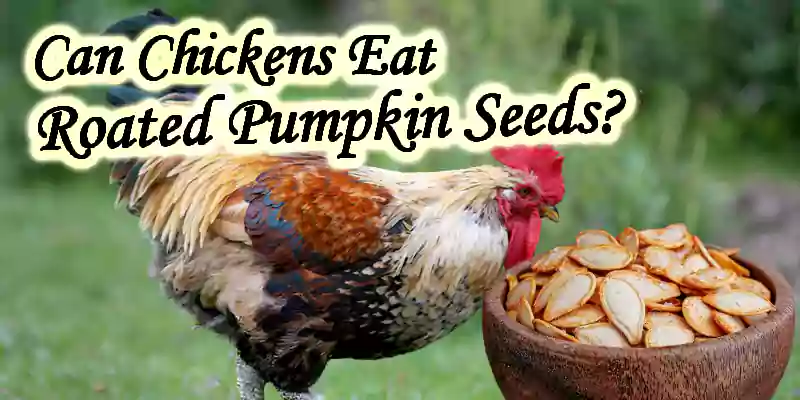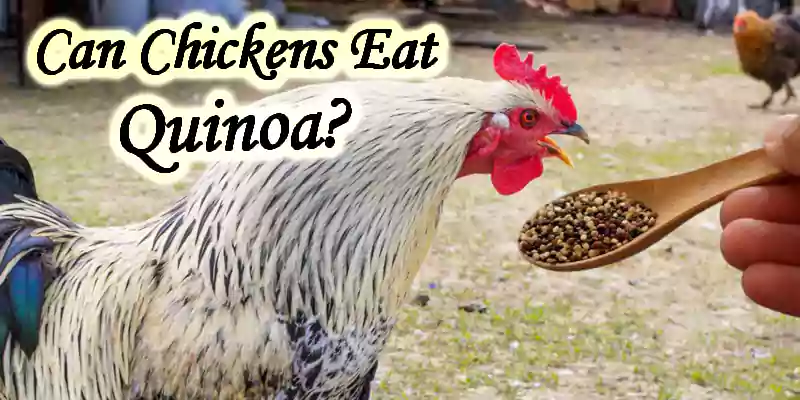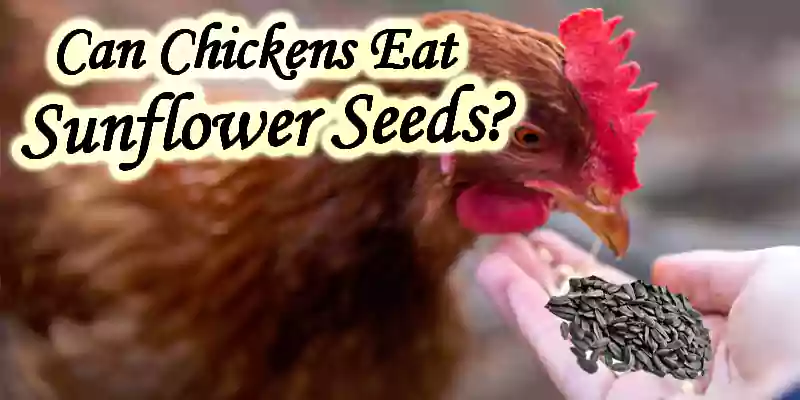Can Chickens Eat Pumpkin Seeds? Everything You Should Know!
Published: 6 Dec 2024
In pursuit of serving chickens a safe, natural, and nutrient-rich diet, one question often arises before chicken owners: can chickens eat Pumpkin seeds? Yes, chickens can enjoy the tiny powerhouse of as part of their regular diet.
Understanding the potential risks and benefits will help you to make them safer for the flock. Excessive or overfeeding them is not good for chickens. You can make an exciting snack for occasional diet. So, let’s dig deep and explore the INS and OUTS of serving these edible nuts to the flock.

Can Chickens Eat Pumpkin Seeds? What You Should Know!
Are Pumpkin Seeds Safe for Chickens?
Yes, pumpkin seeds are safe and healthy for chickens in moderation. Feeding them to the flock does not raise toxic concerns. They offer several nutritional benefits to chickens. Additionally, according to some poultry experts, they are supportive of deworming chickens. The only threat to chickens is overfeeding. Their high fat content leads to obesity, and excessive intake can cause nutritional deficiency.
Nutritional Value of Pumpkin Seeds for Chickens
A nutrient-rich diet is of prime importance for healthy and happy chickens. So, let’s explore the nutrients available in them:
Proteins: They offer a high protein content. Protein is helpful for chickens in muscle development and feather growth, during egg-laying periods, and in digestion.
Healthy Fats: Fat is a good source of energy for chickens. The nuts provide good amounts of dietary fats. They support chickens in the winter season and promote shiny feathers. Flaxseeds are also a good source of dietary fats.
Magnesium: They are packed with magnesium. This mineral helps in muscle growth and strong bones. Magnesium is good for help-laying hens. Poultry experts also suggest Kale for gaining magnesium and its benefits.
Zinc: Zinc is important to boost immunity, heal wounds, and produce strong eggshells. They carry loads of zinc content. You can also add other feeds like peas to get zinc nutrients.
Fiber Content: Fiber is essential for chickens’ digestive systems. The seeds offer dietary fiber, which promotes gut health. Carrots are also a good source of fiber.
Iron: Iron is a vital mineral for transporting oxygen in the blood. It keeps chickens healthy and active. These oily grains help reduce the risk of anemia. Parsley also offers good iron content. Consider it sparingly.
How to prepare Pumpkin Seeds for Chickens?
Proper preparation can make feeding them your chickens a healthy and enjoyable treat. It is essential to ensure safety and maximize the nutritional benefits of the chicken’s diet. Understanding the preparation process minimizes risks like choking or overfeeding. These simple steps will help you provide a safe, nutrient-rich snack your chickens will love.
- Choose Fresh and Raw Pumpkin Seeds: Select grains from fresh Pumpkins, as processed or salted seeds can harm chickens. Avoid using foods coated with oils, spices, or preservatives.
- Clean Thoroughly: Rinse them under clean water to remove any pulp or debris. This ensures your chickens aren’t exposed to harmful mold or bacteria that can grow on leftover Pumpkin residue.
- Dry the Nuts (Optional): You can air-dry or lightly roast the seeds without adding salt or oil. Drying extends shelf life but is optional if you are feeding them fresh.
- Chop or Crush them: Whole form can be too large or tough for some chickens to peck at. If you feed younger birds or bantam breeds, lightly crush or chop them. This reduces the risk of choking and aids digestion.
- Offer in Small Quantities: Serve them as a treat, not a meal replacement. A handful of nuts for a small flock (6–8 chickens) is a good starting point. Overfeeding can lead to an imbalanced diet or weight gain.
- Mix with Other Foods (Optional): To encourage variety, mix crushed with their regular feed or scatter them with other treats like chopped fruits or vegetables.
- Remove Leftovers: After feeding, remove any uneaten grains to prevent mold growth, which can be harmful if ingested. Always ensure chickens have access to clean water and their staple feed.
Can Chickens Eat Pumpkin Seeds Every Day?
No, we do not recommend serving them daily to the flock. Excessive intake may ruin the health of your clucking friends. They are rich in fatty content, which can lead to obesity if taken too frequently. Excessive intake of any occasional diet is problematic for digestion in the flock. They contain a variety of nutrients but not enough value to consider them the primary diet of backyard birds.
Can Baby Chickens Eat Pumpkin Seeds?
During the first 8 weeks, the seeds are not beneficial for chicks. After this period, their immune system can handle a limited quantity of these nutty snacks. You must have to consider some concerns. The grains carry the danger of choking the food tract of a tiny chick. Overfeeding may cause digestive issues in them. The crunchy snacks are hard to consume for chicks. So, we advise you to avoid serving pumpkin grains to young chicks.
Can Chickens Eat Raw Pumpkin Seeds?
Yes, raw foods are beneficial for your flock. They contain several nutritional advantages for hens and cockerels. The raw form of any food has the advantage of being plain and salt-free. There is a lesser chance of health disturbances than with processed foods. It is better to decontaminate and chop them to prevent risks. Never take it as a staple diet for your flock.
Can Chickens Eat Cooked Pumpkin Seeds?
Yes, chickens like a softer diet. The cooking process will make the seeds tender and easier for your backyard friends to consume. It is helpful for younger birds to digest them in a soft texture. Cooked seeds have a lesser amount of harmful bacteria. You should carefully look for some adverse aspects, like the addition of salt or preservatives. Prefer a plain diet for your flock. Ensure moderation!!
Can Chickens Eat Roasted Pumpkin Seeds?
Yes, a roasted diet is beneficial for the flock. It carries specific advantages and drawbacks. A delicately roasted snack is more straightforward for chickens to chew and digest. They love the smoky flavor and crispy texture. The roasted food has minimal moisture, which prevents mold. High temperatures can reduce the diet’s nutritional profile, so serve them sparingly in limited portions.

Can Chickens Eat Dried Pumpkin Seeds?
Yes, chickens can eat dried Pumpkin seeds, but it’s essential to consider both advantages and risks. Dried articles have a long shelf life, making them a convenient treat. They retain most of their nutrients, including protein, healthy fats, and minerals, which support your chickens’ health.
If not stored correctly, dried seeds can attract mold or bacteria, harming chickens. The drying process can also make the seeds tougher, making them harder to digest, especially for younger birds. To safely serve dried foods, ensure they are stored in a cool, dry place and offer them in moderation.
Can Chickens Eat Salted Pumpkin Seeds?
No, chickens should not eat salted Pumpkin seeds. The main reasons for rejecting the use of salted diet for chickens are:
- Salt is harmful to chickens in large amounts.
- It can lead to dehydration, kidney damage, and even death.
- Salted seeds can cause imbalances in their electrolyte levels.
- It can reduce the egg production in hens.
- Chickens are not equipped to handle high sodium levels in their diet, and regular consumption of salted snacks can lead to long-term health issues.
To ensure the well-being of your flock, only offer unsalted, plain diet and avoid any seasoning, including salt.
Can Chickens Eat Sprouted Pumpkin Seeds?
Yes, chickens can eat sproutes, which provide several benefits. Here are some common advantages:
- Enhanced Nutrients: Sprouting increases the bioavailability of nutrients like protein, vitamins, and minerals, making them easier for chickens to absorb.
- Improved Digestion: Sprouted seeds are softer and easier to digest than raw, unsprouted seeds, which can be harsh on chickens’ digestive systems.
- Natural Enzyme Boost: The sprouting process activates enzymes that aid in digestion and can help maintain gut health.
- Increased Antioxidants: Sprouted seeds contain higher antioxidants, which support overall immune health and reduce oxidative stress.
Sprouted nuts/beans can be a great addition to your chickens’ diet, offering nutritional benefits while being gentle on their digestive systems.
Can Chickens Eat Baked Pumpkin Seeds?
Chickens can technically eat baked foods, but it’s generally not recommended. Here’s why:
- Nutrient Loss: Baking at high temperatures can cause a loss of essential nutrients like vitamins and antioxidants, reducing their nutritional value.
- Tough Texture: Baking can harden the seeds, making it more difficult for chickens, significantly smaller or younger ones, to digest and chew properly.
- Risk of Additives: Baking with added oils, salt, or seasonings can make the seeds unhealthy for chickens, potentially leading to dehydration or other health issues.
For healthier options, serve raw or lightly roasted diet without additives.
Can Chickens Eat Shelled Pumpkin Seeds?
Yes, chickens can eat shelled grains, and there are several benefits to serving them this way:
- Easier Digestion: Shelled nuts are softer and easier to chew and digest, especially for younger or smaller chickens. Removing the outer shell ensures that chickens can access the nutritious inner seed without difficulty.
- No Choking Hazard: Shelled seeds eliminate the risk of choking, which can occur with whole, unshelled seeds. This makes them a safer option for flocks of all sizes.
- Nutrient Absorption: Without the tough outer shell, chickens can more efficiently absorb the proteins, healthy fats, and minerals from the oil-rich foods.
Serving shelled nuts ensures chickens get the maximum nutritional benefit in a safe and digestible form.
Can Chickens Eat Whole Pumpkin Seeds?
Yes, chickens can eat whole Pumpkin seeds, but there are pros and cons. Whole seed is a natural, unprocessed treat rich in protein, healthy fats, and minerals. Pecking at them provides mental stimulation and keeps your chickens entertained while helping them maintain healthy beaks.
Whole seeds can be too large or tough for some chickens, particularly younger birds or smaller breeds, posing a choking risk. They may also struggle to digest the outer shell. To minimize risks, crush or chop the seeds for easier consumption, especially smaller flocks, while providing the same nutritional benefits.
Benefits of Pumpkin Seeds for Chickens
Pumpkin seeds can benefit chickens, as recommended in the earlier section. They can support various aspects of your flock’s health when offered in moderation and prepared correctly.
|
These benefits make them a great occasional treat for chickens when prepared safely and served in moderation.
Potential Risks of Feeding Pumpkin Seeds to Chickens
While Pumpkin seeds offer many benefits for chickens, it’s essential to understand the potential risks before serving them. Ensuring proper preparation and moderation can prevent health issues for your flock.
|
Other Seeds Recommended for Chickens
These seeds and grains provide unique nutritional benefits, making them excellent alternatives to Pumpkin seeds for variety and balanced nutrition. You may consider them while replacing them for chickens:
- Sunflower Seeds: Rich in healthy fats and protein, sunflower seeds promote energy, feather health, and overall growth. For best results, opt for unsalted, raw, or roasted seeds.
- Flax seeds: Packed with omega-3 fatty acids, flax seeds enhance egg quality, improve skin and feather condition, and support digestion. Serve them ground for better nutrient absorption.
- Sesame Seeds: These tiny, nutrient-dense seeds are high in calcium, which supports bone health and eggshell strength. They also provide healthy fats and protein for overall chicken health.
- Chia Seeds: High in fiber, protein, and omega-3 fatty acids, chia seeds support digestive health, feather growth, and immune function. They can be sprinkled directly into feed or offered soaked.
- Oats: A great source of fiber and vitamins, oats help regulate digestion and provide a slow-release energy source for chickens. They can be offered whole, crushed, or in oatmeal form.
- Wheat: A common grain, wheat offers carbohydrates for energy and helps in growth and egg production. Whole or cracked wheat can be added to your chickens’ diet in moderation.
Conclusion
Pumpkin seeds are a nutritious and beneficial treat for chickens when served properly and in moderation. They provide essential nutrients that support feather growth, egg production, and overall health, making them a valuable addition to your flock’s diet.
However, understanding the risks, such as overfeeding, choking hazards, or nutrient imbalances, is crucial to ensure safe consumption. Always prepare them appropriately. You should prefer unsalted, clean, and crushed for smaller chickens to maximize their benefits.
As part of a balanced diet, they can enhance your chickens’ well-being while adding variety to their meals, keeping your flock happy, healthy, and thriving.
FREQUENTLY ASKED QUESTIONS
Yes, chickens can eat uncooked Pumpkin seeds. They retain their full nutritional value but ensure the seeds are clean and free from mold or contaminants.
Chickens can eat unshelled Pumpkin seeds, but the tough outer shell may be hard for some to digest. Crushing or chopping them is easier and safer, especially for smaller birds.
Yes, they are safe and nutritious for chickens. However, they must be properly cleaned and offered in moderation to avoid excess moisture or bacterial growth.
When harvested too early, green pumpkin seeds may be tougher and harder to digest. It’s best to wait for fully matured seeds for easier consumption and maximum nutritional benefits.
Large size can be difficult for some chickens to eat. Cutting or crushing large seeds into smaller pieces ensures they are digestible and safer for your flock.
Yes, Silkie chickens can eat them. Due to their small size, it’s best to crush or chop the seeds into smaller pieces to prevent choking or digestive issues.
Bantam chickens can enjoy pecking them, but due to their small size, it’s essential to crush or chop them to make them easier to digest and prevent choking hazards.
While they are often claimed to help with deworming, the evidence is limited. They can be part of a healthy diet but should not replace proven deworming treatments.
Offer raw, unsalted, and in moderation. Crush or chop them for easier digestion, mix them with other treats, or add them to their regular feed for variety.

- Be Respectful
- Stay Relevant
- Stay Positive
- True Feedback
- Encourage Discussion
- Avoid Spamming
- No Fake News
- Don't Copy-Paste
- No Personal Attacks

- Be Respectful
- Stay Relevant
- Stay Positive
- True Feedback
- Encourage Discussion
- Avoid Spamming
- No Fake News
- Don't Copy-Paste
- No Personal Attacks


